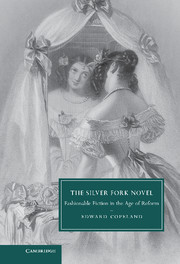Description
The Silver Fork Novel
Fashionable Fiction in the Age of Reform
Cambridge Studies in Nineteenth-Century Literature and Culture Series
Author: Copeland Edward
This first modern study of silver-fork novels investigates their role in the alliance of middle class and aristocratic political principles.
Language: EnglishApproximative price 107.81 €
In Print (Delivery period: 14 days).
Add to cart
The Silver Fork Novel
Publication date: 06-2012
Support: Print on demand
Publication date: 06-2012
Support: Print on demand
Approximative price 30.28 €
In Print (Delivery period: 14 days).
Add to cart
The Silver Fork Novel
Publication date: 03-2015
Support: Print on demand
Publication date: 03-2015
Support: Print on demand
Description
/li>Contents
/li>Biography
/li>
In the early nineteenth century there was a sudden vogue for novels centering on the glamour of aristocratic social and political life. Such novels, attractive as they were to middle-class readers, were condemned by contemporary critics as dangerously seductive, crassly commercial, designed for the 'masses' and utterly unworthy of regard. Until recently, silver-fork novels have eluded serious consideration and been overshadowed by authors such as Jane Austen. They were influenced by Austen at their very deepest levels, but were paradoxically drummed out of history by the very canon-makers who were using Austen's name to establish their own legitimacy. This first modern full-length study of the silver-fork novel argues that these novels were in fact tools of persuasion, novels deliberately aimed at bringing the British middle classes into an alliance with an aristocratic program of political reform.
1. Cultural contexts; 2. Edgeworth, Burney and Austen; 3. Reform and the silver fork novel; 4. Newspapers and the silver fork novel; 5. The topography of silver fork London; 6. Performing reform, silver fork heroines.
Edward Copeland is Emeritus Professor of English at Pomona College, Claremont, California.
© 2024 LAVOISIER S.A.S.
These books may interest you

Fashioning the Silver Fork Novel 177.01 €

Fashioning the Silver Fork Novel 64.97 €



